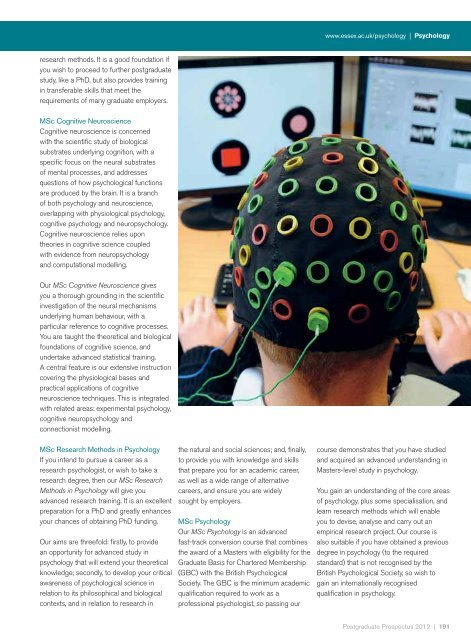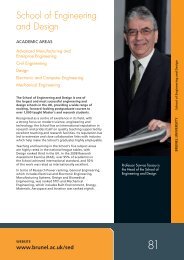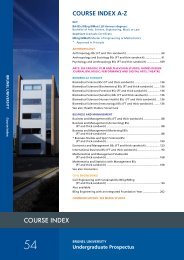Postgraduate Prospectus
Postgraduate Prospectus
Postgraduate Prospectus
You also want an ePaper? Increase the reach of your titles
YUMPU automatically turns print PDFs into web optimized ePapers that Google loves.
www.essex.ac.uk/psychology | Psychology<br />
research methods. It is a good foundation if<br />
you wish to proceed to further postgraduate<br />
study, like a PhD, but also provides training<br />
in transferable skills that meet the<br />
requirements of many graduate employers.<br />
MSc Cognitive Neuroscience<br />
Cognitive neuroscience is concerned<br />
with the scientific study of biological<br />
substrates underlying cognition, with a<br />
specific focus on the neural substrates<br />
of mental processes, and addresses<br />
questions of how psychological functions<br />
are produced by the brain. It is a branch<br />
of both psychology and neuroscience,<br />
overlapping with physiological psychology,<br />
cognitive psychology and neuropsychology.<br />
Cognitive neuroscience relies upon<br />
theories in cognitive science coupled<br />
with evidence from neuropsychology<br />
and computational modelling.<br />
Our MSc Cognitive Neuroscience gives<br />
you a thorough grounding in the scientific<br />
investigation of the neural mechanisms<br />
underlying human behaviour, with a<br />
particular reference to cognitive processes.<br />
You are taught the theoretical and biological<br />
foundations of cognitive science, and<br />
undertake advanced statistical training.<br />
A central feature is our extensive instruction<br />
covering the physiological bases and<br />
practical applications of cognitive<br />
neuroscience techniques. This is integrated<br />
with related areas: experimental psychology,<br />
cognitive neuropsychology and<br />
connectionist modelling.<br />
MSc Research Methods in Psychology<br />
If you intend to pursue a career as a<br />
research psychologist, or wish to take a<br />
research degree, then our MSc Research<br />
Methods in Psychology will give you<br />
advanced research training. It is an excellent<br />
preparation for a PhD and greatly enhances<br />
your chances of obtaining PhD funding.<br />
Our aims are threefold: firstly, to provide<br />
an opportunity for advanced study in<br />
psychology that will extend your theoretical<br />
knowledge; secondly, to develop your critical<br />
awareness of psychological science in<br />
relation to its philosophical and biological<br />
contexts, and in relation to research in<br />
the natural and social sciences; and, finally,<br />
to provide you with knowledge and skills<br />
that prepare you for an academic career,<br />
as well as a wide range of alternative<br />
careers, and ensure you are widely<br />
sought by employers.<br />
MSc Psychology<br />
Our MSc Psychology is an advanced<br />
fast-track conversion course that combines<br />
the award of a Masters with eligibility for the<br />
Graduate Basis for Chartered Membership<br />
(GBC) with the British Psychological<br />
Society. The GBC is the minimum academic<br />
qualification required to work as a<br />
professional psychologist, so passing our<br />
course demonstrates that you have studied<br />
and acquired an advanced understanding in<br />
Masters-level study in psychology.<br />
You gain an understanding of the core areas<br />
of psychology, plus some specialisation, and<br />
learn research methods which will enable<br />
you to devise, analyse and carry out an<br />
empirical research project. Our course is<br />
also suitable if you have obtained a previous<br />
degree in psychology (to the required<br />
standard) that is not recognised by the<br />
British Psychological Society, so wish to<br />
gain an internationally recognised<br />
qualification in psychology.<br />
<strong>Postgraduate</strong> <strong>Prospectus</strong> 2012 | 191

















